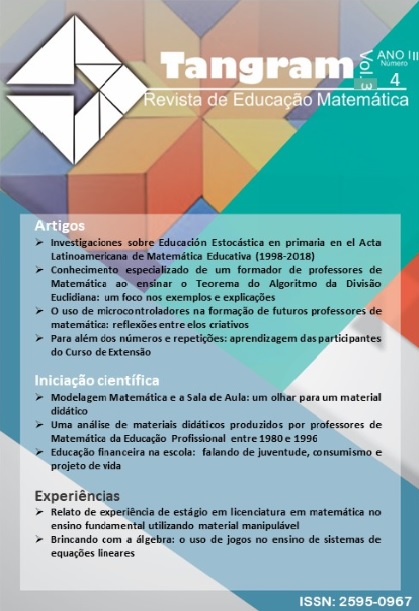Playing with Algebra: The use of games in teaching of systems of linear equations
DOI:
https://doi.org/10.30612/tangram.v3i4.10968Keywords:
Teaching algebra. Mathematics games. Systems of linear equations.Abstract
This article aims to report the experience of teaching algebra to students in the eighth grade of elementary school. The purpose of the work is to analyze the students' responses seeking to understand how they deal with the difficulties encountered when solving problems related to systems of linear equations. As a result, it was observed that the majority of the class understood the processes of solving the systems of polynomial equations of the first degree, as well as a remarkable participation of the class, generated by the increase in their level of interest in solving the tasks. In addition, there is an improvement in cooperation between students.Downloads
References
Almeida, P. N. (2008). Educação Lúdica: técnicas e jogos pedagógicos. São Paulo: Loyola.
Cedro, W., & Moura, M. (2007). Uma perspectiva histórico-cultural para o ensino de álgebra: o clube de matemática como espaço de aprendizagem. Zetetike, 15(1), 37-56.
Costa, A., Azevedo, J., Rodrigues, M., Hauschild, C., & Dullius, M. (2016). Investigando as dificuldades apresentadas em álgebra por alunos do oitavo ano do ensino fundamental. Revista Destaques Acadêmicos, Lajeado, v. 8, n. 4, 159-176.
Lins, R., & Gimenez, J. (2001). Perspectivas em Aritmética e Álgebra para o século XXI. Campinas, SP: Papirus.
Moura, M. (1994). A Séria busca no jogo: do lúdico na matemática. In: T. Kishimoto (Org). Jogos, brinquedos, brincadeira e educação. São Paulo: Cortez.
Murcia, J. (org.). (2008). Aprendizagem através do jogo. Porto Alegre: Artmed.
Panossian, M., & Moura, M. (2010). Fantan: um jogo para ensinar e aprender álgebra. In A. Lopes & P. Pereira (Orgs.). Ensaios em Educação matemática: algumas possibilidades para a educação básica. Campo grande: ed. UFMS.
Smole, K., Diniz, M., & Milani, E. (2007). Cadernos do Mathema: Jogos de matemática de 6° a 9° ano. Porto Alegre: Artmed.
Sousa, M., Panossian, M., & Cedro, W. (2014). Do movimento lógico e histórico à organização do ensino: o percurso dos conceitos algébricos. Campinas, SP: Mercado de letras.
Strapason, L., & Bisognin, E. (2013). Jogos pedagógicos para o ensino de funções no primeiro ano do Ensino Médio. Bolema, 27(46), 579-595.
Vygotsky, L. (1987). The collected works of L. S. Vygotsky, vol.1, Problems of general psychology including Thinking and speech. New York: Plenim Press.
Downloads
Published
How to Cite
Issue
Section
License
Authors must accept the publication rules when submitting the journal, as well as agree to the following terms:
(a) The Editorial Board reserves the right to make changes to the Portuguese language in the originals to maintain the cultured standard of the language, while respecting the style of the authors.
(b) Authors retain the copyright and grant the journal the right to first publication, with the work simultaneously licensed under the Attribution-NonCommercial-ShareAlike 3.0 Brazil (CC BY-NC-SA 3.0 BR) that allows: Share - copy and redistribute the material in any medium or format and Adapt - remix, transform, and create from the material. CC BY-NC-SA 3.0 BR considers the following terms:
- Attribution - You must give the appropriate credit, provide a link to the license and indicate whether changes have been made. You must do so under any reasonable circumstances, but in no way that would suggest that the licensor supports you or your use.
- NonCommercial - You may not use the material for commercial purposes.
- Sharing - If you remix, transform, or create from material, you must distribute your contributions under the same license as the original.
- No additional restrictions - You may not apply legal terms or technological measures that legally restrict others from doing anything that the license permits.
(c) After publication, authors are allowed and encouraged to publish and distribute their work online - in institutional repositories, personal page, social network or other scientific dissemination sites, as long as the publication is not for commercial purposes.






